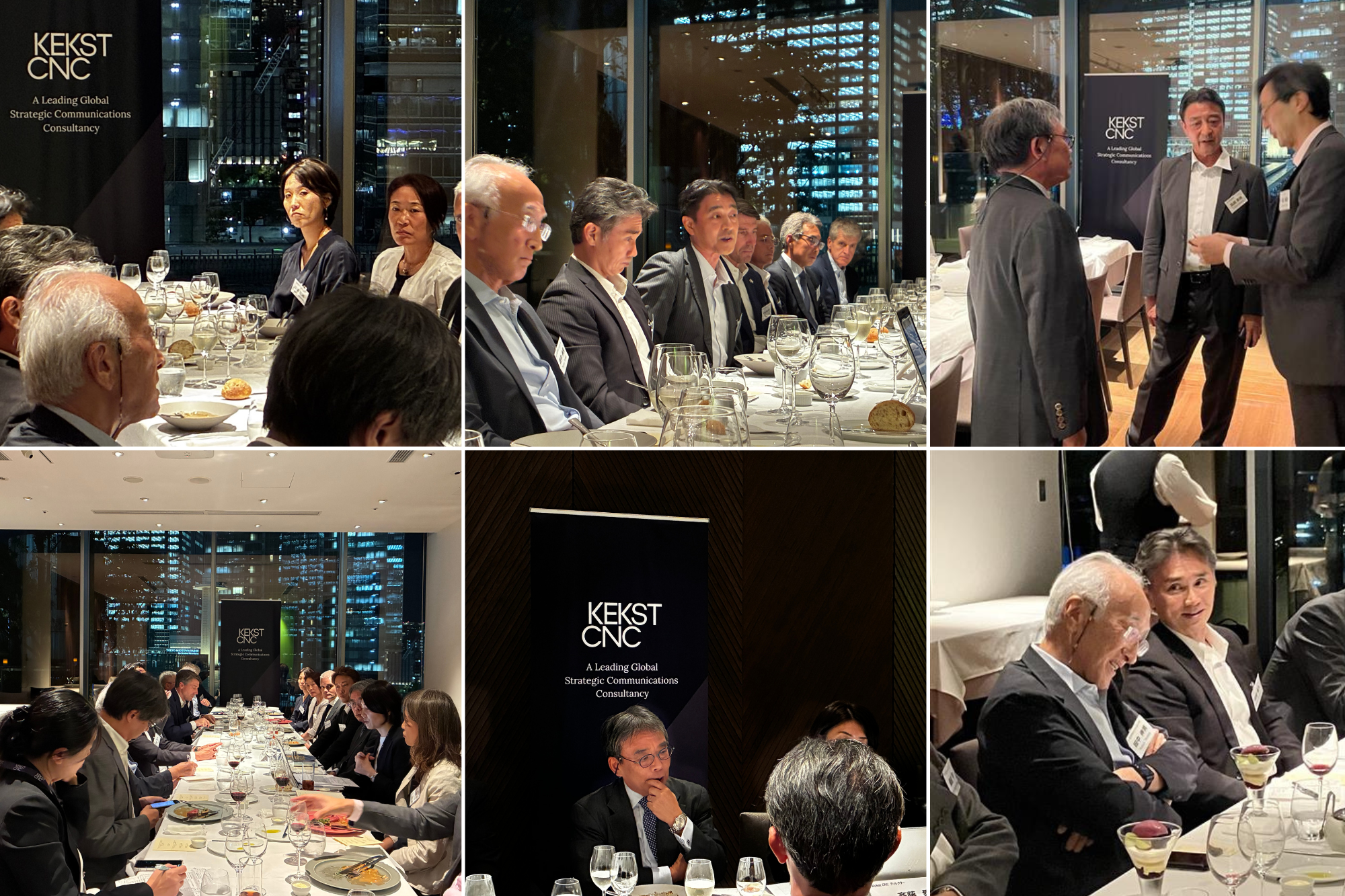*日本語の後に英語が続きます/English follows Japanese
Kekst CNC 東京は、2025年10月2日(木)に、エネルギー・ユーティリティ業界を対象としたネットワーキングディナーを開催しました。「エネルギー・ユーティリティ業界におけるファイナンシャル・レジリエンスの強化 〜アクティビズムとレピュテーションリスクへの備え〜」をテーマに、業界の第一線で活躍するシニアリーダーおよび有識者が集い、重要課題について意見交換を行いました。
ゲストスピーカーとしてお迎えした日本経済新聞 編集委員 小平龍四郎氏による基調講演では、アクティビストが注目するポイント、日本の投資環境および企業風土がアクティビストにとって好都合である理由、そして投資家と企業の間に存在する認識のずれについて、示唆に富んだ内容をお話しいただきました。
続いて行われたディスカッション・セッションでは、Kekst CNC がモデレーターを務め、参加者同士が各社の取り組みや直面する課題を共有し、業界全体でのベストプラクティスを探る有意義な対話が展開されました。
主なディスカッション内容:
- ファイナンシャル・レジリエンスの定義
ファイナンシャル・レジリエンスは、強固な財務基盤に加え、戦略的なコミュニケーション、健全なガバナンス体制、ステークホルダーとの信頼関係が不可欠であるとの認識が共有されました。 - ファイナンシャル・レジリエンスを揺るがす主な要因
地政学的リスクの高まり、株主アクティビズムの活発化、燃料価格の変動などが、企業のファイナンシャル・レジリエンスに影響を及ぼす重要な要因として挙げられました。 - レジリエンス強化に必要な要素
戦略的コミュニケーション、部門横断的な連携、そして先手を打ったリスク管理が、企業のレジリエンス強化に不可欠な要素として位置づけられました。 - 各組織のベストプラクティスの共有
参加者はそれぞれの立場から、実践的な取り組みや経験を共有しました。
議論を通じて得られた示唆:
- 長期的視点を持った戦略的柔軟性
外部環境の急激な変化や予期せぬ混乱に直面した場合でも、企業が目指すべき方向性を見失わず、柔軟かつ的確に対応するためには、柔軟性を備えた組織体制の構築が不可欠です。レジリエンス強化のためには、こうした体制を整え、状況に応じて迅速かつ的確に対応できる戦略を策定するとともに、一貫性のある長期的なビジョンを堅持することが重要です。
- 企業理念と業績の両立
企業の存在意義が環境や社会課題と深く結びつく時代において、企業理念と財務的な持続可能性(収益性・資本効率)をいかに両立させるかが、重要な課題です。企業のミッションに基づく施策は、社会的意義のみならず、投資家の期待や事業運営の現実性にも十分に配慮した、実行可能なものである必要があります。
- 一貫性と透明性のあるステークホルダーコミュニケーション
レピュテーションリスクを適切に管理するためには、IR、広報、公共政策、地域連携などの各領域において一貫性のあるメッセージを発信することが重要です。このような一貫性のあるコミュニケーションは、社内外のステークホルダーとの信頼構築と企業戦略との整合性を支える基盤となります。
- 平常時におけるレジリエンス強化への投資
外部環境が安定している時期は、ガバナンス体制やインフラ、ステークホルダーとの関係性を強化する絶好の機会です。また、将来を見据えた計画や複数のシナリオを事前に策定しておくことで、予測困難な状況にも、柔軟かつ的確に対応することが可能となります。
今回のディナーでは、企業・組織を越えた対話を通じて、企業のレジリエンス強化に向けた多くの示唆が得られました。Kekst CNCは、戦略的コミュニケーション・アドバイザーとしての専門性を活かし、企業が持続可能な成長を目指せるよう、今後も支援を続けてまいります。 ご参加いただいた皆さまには、貴重なご意見とご協力を賜り、心より感謝申し上げます。

English
On Thursday, October 2, 2025, Kekst CNC Tokyo hosted a networking dinner for senior leaders and experts from across the energy and utilities sector. The event centered on the theme: “Strengthening Financial Resilience in the Energy and Utilities Sector — Preparing for Activism and Reputation Risk.”
The event brought together industry professionals for an open exchange of perspectives on key challenges and strategies to enhance corporate resilience.
We welcomed Mr. Ryushiro Kodaira, Editorial Writer and Senior Staff Writer at Nikkei to deliver a keynote on activist pressure points, the reasons Japan’s investment climate and corporate culture are particularly conducive to activist, and the perception gaps that often exist between companies and their investors.
In the discussion that followed, moderated by Kekst CNC, participants shared their respective initiatives and challenges, engaging in a meaningful exchange aimed to identifying insights and best practices across the industry.
Following were the main discussion topics:
- Defining financial resilience
Financial resilience today not only means to have a strong financial base but also to have a robust communication strategy, governance and solid stakeholder trust - Key challenges impacting financial resilience
Rising geopolitical risks, shareholder activism, and persistent fuel cost volatility were top challenges impacting financial resilience. - Factors essential to strengthening financial resilience
Strategic communications, cross-functional coordination, and proactive risk management emerged as essential tools. - Best practices across the organizations
Participants exchanged their best practices from different perspectives.
Key Takeaways:
- Strategic flexibility with long-term vision
Resilience requires a strategic business strategy that can adapt to fast-changing external conditions while maintaining a consistent long-term direction. Building systems that support tactical agility helps organizations stay aligned with their goals even during disruption.
- Balancing purpose with performance
As environmental and social commitments become central to corporate identity, companies must align these values with financial sustainability. This means ensuring that mission-driven initiatives are not only impactful but also viable from an investor and operational standpoint.
- Unified and transparent stakeholder communications
Managing reputational risk depends on consistent messaging across public/investor relations, public affairs, and community engagement. Clear communications builds trust and supports strategic alignment with both internal and external stakeholders.
- Investing during stable times to build resilience
Stable periods offer a critical window to strengthen governance, infrastructure, and stakeholder relationships. Proactive planning and scenario development during these times enable organizations to respond more effectively when disruptions arise.
Kekst CNC remains committed to supporting sustainable growth and resilience in Japan’s energy and utilities sector. We gained valuable insights into how cross-organizational dialogue can strengthen resilience. Leveraging our expertise as strategic communications advisors, we will continue to facilitate meaningful engagement and collaboration across the industry.

